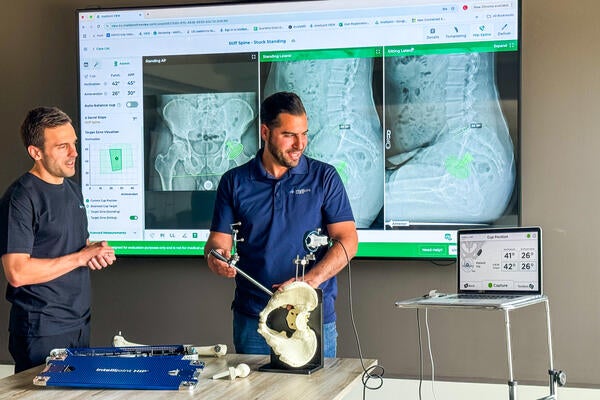
Medical doctor studies entrepreneurship at Waterloo
Doctor says his startup will improve patient care by giving medical teams better access to patient records

Doctor says his startup will improve patient care by giving medical teams better access to patient records
By Dave Pink Communications and Public AffairsWhile working as a doctor, Ali Esmail noticed a serious problem in hospitals: patient care suffered because there was no way for a patient’s medical team to easily share information.
 “The way that people communicate inside a hospital is very archaic, and since the introduction of electronic records it’s only become worse,” says Dr. Esmail, who is pursuing a Master of Business, Entrepreneurship and Technology at the University’s Conrad Business, Entrepreneurship and Technology Centre.
“The way that people communicate inside a hospital is very archaic, and since the introduction of electronic records it’s only become worse,” says Dr. Esmail, who is pursuing a Master of Business, Entrepreneurship and Technology at the University’s Conrad Business, Entrepreneurship and Technology Centre.
Dr. Esmail has taken a break from his residency as a specialist in head and neck surgery at the University of Manitoba, to help solve the problem of communication in hospitals. He is learning how to take a new software program– Medlinx - to market.
Medlinx is a platform that will allow every hospital professional – surgeons, doctors, nurses or dieticians – access to the information they need with just a few keystrokes. And, says Dr. Esmail, entering patient information into an electronic file won’t add to anyone’s workload.
Mobile platform for medical teams
“Basically, it’s a mobile collaborative platform for medical teams,” he says. “You know who’s on your team, you know what’s going on, and it’s accessible any time.
“This way you can have everybody working toward the same goal of getting a patient to the point of discharge. The whole team can co-ordinate on the care.”
An added plus to Medlinx is that it can be shared with the patient. “It’s an indisputable fact that patients involved in their own care get better faster,” says Dr. Esmail. “We give them the basic plan, so they know what’s going on.”
Dr. Esmail, who says he’s always been conflicted between the study of medicine and business, says the MBET program was the easy and obvious choice. He looked at the programs offered at several other universities in Canada and the U.S., but Waterloo offered exactly what he wanted.
MBET takes your vision and makes it a reality
“The MBET program had a unique appeal. Here, they let you take your vision and make it a reality,” says Dr. Esmail. “After being in school for 10 years I didn’t want to be in a classroom. I needed to do things, and I needed somebody to show me how to do those things.”
Dr. Esmail will complete the MBET program in July, then return to his hospital residency in Winnipeg.

Read more
Two University of Waterloo affiliated health-tech companies secure major provincial investment to bring lifesaving innovations to market

Read more
How Doug Kavanagh’s software engineering degree laid the foundation for a thriving career in patient care

Read more
Upside Robotics secures new funding to accelerate the future of sustainable farming
The University of Waterloo acknowledges that much of our work takes place on the traditional territory of the Neutral, Anishinaabeg, and Haudenosaunee peoples. Our main campus is situated on the Haldimand Tract, the land granted to the Six Nations that includes six miles on each side of the Grand River. Our active work toward reconciliation takes place across our campuses through research, learning, teaching, and community building, and is co-ordinated within the Office of Indigenous Relations.